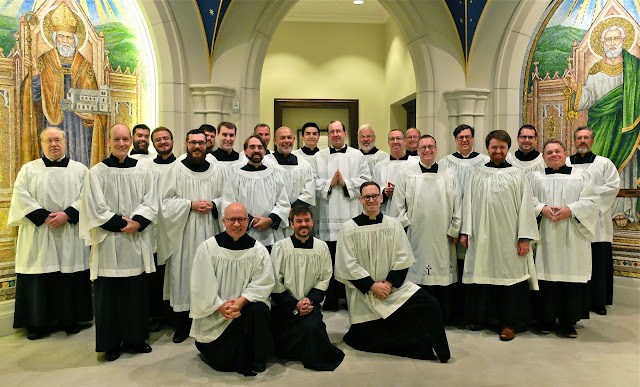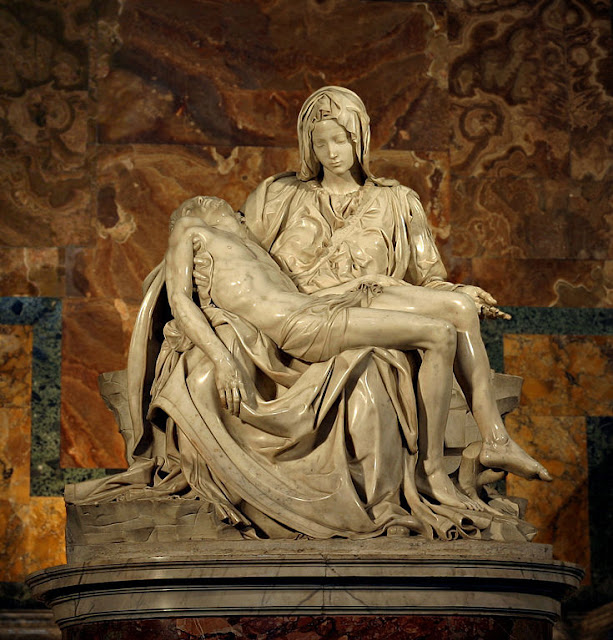Reality 101: The Requiem (Said) Mass
H/T Mons. P. Wilkinson whose homily inspired this post.
This past Monday's daily Mass was a Requiem. Astute Mass-goers will recall the more obvious differences in the Mass:
- the Judica Me psalm is omitted in the Prayers of Preparation (Prayers at the Foot).
- the Tract replaces the Alleluia.
- the Dies Irae (Day of Wrath) is said.
- the endings to the Agnus Dei are different. Instead of "...have mercy upon us/grant us thy peace", we pray ..."grant them rest/grant them rest everlasting."
The uplifting beauty of the Requiem Mass, which distinguishes it from trite memorials, 'celebrations of life' and other 'Ain't I Great!' services, is its complete focus on God. We pray to the Father Almighty for our departed loved-ones. If we are tempted to canonize our dead relatives, friends and coworkers, the Requiem thwarts that temptation and returns our attention to our Maker, the God Who knows who and what we truly are.
As the Collect for Purity reminds:
ALMIGHTY God, unto whom all hearts be open, all desires known, and from whom no secrets are hid: cleanse the thoughts of our hearts by the inspiration of thy Holy Spirit, that we may perfectly love thee, and worthily magnify thy holy Name; through Christ our Lord. Amen
To be immersed in the Requiem Mass is to be confronted with reality itself. Real knowledge of self, real understanding of the condition of one's soul, is a joy for anyone seeking an eternity with God. We learn of God's right judgement and to trust in His mercy. We know that, with God's grace, we are capable of changing our lives. Thus, we avoid giving in to despair. By God's grace, we rise above the misery that so many fall prey to and rise above the smog of empty promises offered by quick and easy - that is, cheap - "solutions" to life's challenges.
The Requiem is a sobering reminder that we mortals - created by God to love Him and to enjoy His gifts in the ways He has designed for our happiness - have an expiry date. We should be prepared for death, and the ways the Church provides for us to prepare for death are loving and kind, but not without requiring (graced) effort to conform our hearts and minds and bodies to the will of God.
The Requiem is a sobering reminder that we mortals - created by God to love Him and to enjoy His gifts in the ways He has designed for our happiness - have an expiry date. We should be prepared for death, and the ways the Church provides for us to prepare for death are loving and kind, but not without requiring (graced) effort to conform our hearts and minds and bodies to the will of God.
- We must confront sin in our lives.
- We must reject sin and ask God for the grace to live good and holy lives.
- Loving God and neighbour is only fully possible if we invite the assistance of the grace of God. Only God can give us the peace which enables us to move charitably in a cacophonous world.
- The observation of days of fasting and abstinence, including the Ember and Rogation Days, provides us with opportunities to dispose ourselves to God's grace.
The inclusion after the Tract of the sequence Dies Irae which begins...
Day of wrath and doom impending.
David's word with Sibyl's blending,
Heaven and earth in ashes ending.
Oh, what fear man's bosom rendeth,
When from heaven the Judge descendeth,
On whose sentence all dependeth.
and concludes...
Ah! that day of tears and mourning,
From the dust of earth returning
Man for judgement must prepare him,
Spare, O God, in mercy spare him.
Lord, all-pitying, Jesus blest,
Grant them Thine eternal rest. Amen.
... is likely to prompt in us more than a mild discomfort and foster the urgent need to confront the state of our souls.
Sadly, the Dies Irae has been removed from the Ordinary Form of the Mass. Its omission is a surely a deprivation contributing to the false understanding among many Catholics that all souls make their way to heaven. Sadly, that universalist way of thinking (heresy) is not the teaching of Jesus Christ, Who taught
St Matthew 7:13-14
Enter by the narrow gate; for the gate is wide and the way is easy, that leads to destruction, and those who enter by it are many. For the gate is narrow and the way is hard, that leads to life, and those who find it are few.When the Penitential Rite is prayed, it begins with the priest saying
Ye that do truly and earnestly repent you of your sins, and are in love and charity with your neighbours, and intend to lead a new life, following the commandments of God, and walking from henceforth in his holy ways: draw near with faith, and make your humble confession to Almighty God, meekly kneeling upon your knees.
Then all pray... .
ALMIGHTY God, Father of our Lord Jesus Christ, maker of all things, judge of all men: We acknowledge and bewail our manifold sins and wickedness, which we from time to time most grievously have committed, by thought, word, and deed, against thy divine majesty, provoking most justly thy wrath and indignation against us. We do earnestly repent, and are heartily sorry for these our misdoings; the remembrance of them is grievous unto us, the burden of them is intolerable. Have mercy upon us, have mercy upon us, most merciful Father; for thy Son our Lord Jesus Christ’s sake, forgive us all that is past; and grant that we may ever hereafter serve and please thee in newness of life, to the honour and glory of thy Name; through Jesus Christ our Lord. Amen.
This amazing rite, which truly calls forth in us a repentant heart, concludes with the priest saying:
May Almighty God, our heavenly Father, who of his great mercy hath promised forgiveness of sins to all those who with hearty repentance and true faith turn unto him, have mercy on us, pardon and deliver us from all our sins, confirm and strengthen us in all goodness, and bring us to everlasting life; through Jesus Christ our Lord. Amen.
This is the point, dear readers, where we acquaint ourselves with the location of the nearest Catholic Church and confession times.

.jpg)





Comments
Post a Comment
Your comments will be appreciated and posted if 1) they are on topic and 2) preserve decorum.
Stand by your word.